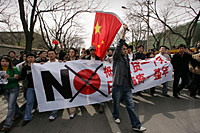




HONG KONG—Thousands of Chinese protesters took to the streets of Shanghai, hurling bottles and stones at the Japanese Embassy in a third week of protest against Japan's handling of its wartime past.
"At the beginning, the demonstrators numbered only a few hundred, but by 10:10 a.m., as it proceeded towards Yanan West Road, the numbers had swelled to around 100,000," the official Xinhua news agency wrote in a highly unusual dispatch on its domestic news service.
"The protesters were not just composed of students, but some ordinary citizens as well," the agency said.
China's official media are usually banned from reporting sensitive news like mass protests and civil unrest.
"In Hangzhou, around 10,000 people, young people, students, and ordinary citizens, took to the streets to protest Japan's application for a permanent seat on the U.N. Security Council," Xinhua said.
But as Tokyo protested the violent upsurge in anti-Japan sentiment, Beijing appeared to begin damage control, warning citizens not to take part in unauthorized protests and saying the government could be trusted to handle relations with Japan.
Security was stepped up around the Japanese consulate in Shanghai, where protesters shouted "Japanese invaders must die", throwing rocks and bottles at the buildings.
The protests followed widespread stoking of nationalist fervor on the Internet in recent days, following a dispute with Japan over its handling of its wartime past, and Tokyo's bid for a permanent seat on the United Nations Security Council.
Most of the people of Japan, China, and South Korea ought to feel strongly that it is good to look toward the future and have friendly ties, and we must hope for the development of relations from now on.
Bulletin boards were seething with discussion of a Japanese history textbook which critics say whitewashes the atrocities of Japanese troops in China, who were found by a war crimes tribunal to have killed at least 140,000 civilians in the Nanjing massacre (1937-1938) alone.
On the bulletin boards of the official People's Daily Web site, around 11 percent of postings discussed the textbook and other Japan-related issues Saturday.
"Don't we still have the hydrogen bomb? Is it just a toy? Why haven't we dropped a couple on Japan?" one post commented.
"Opposing Japan is absolutely not the way to go. The only thing to do is to study Japan, learn from its experience in building itself up, and make China a prosperous nation," commented another.
Others pointed out that the number of Japanese students who would see the controversial textbook, written by nationalist Japanese historians, was relatively small.
Some were concerned that Emperor Akihito and Empress Michiko would visit a shrine to Japanese war dead during their forthcoming visit to Saipan.
"I have no preconceived notions about these two people, but if they do that it will be disastrous to their image." one post said.
Japan's Foreign Ministry lodged a protest, saying the Chinese government had failed to protect Japan's diplomatic and commercial facilities from damage by protesters and urging Beijing to take serious steps to prevent a recurrence.
Japan's Prime Minister Junichiro Koizumi appealed for calm.
"Most of the people of Japan, China, and South Korea ought to feel strongly that it is good to look toward the future and have friendly ties, and we must hope for the development of relations from now on," local media quoted Koizumi as saying.
In the eastern city of Hangzhou, 10,000 protesters chanted anti-Japanese slogans and handed out fliers calling for a boycott of Japanese goods, witnesses said. Another 2,000 people marched in the northern port city of Tianjin.
"We have been putting notices on the Internet, telling people not to join in the demonstrations," a spokeswoman at the Japanese consulate in Shanghai told RFA's Mandarin service in an interview Friday.
Meanwhile, thousands of paramilitary police were drafted onto the streets of Beijing, heading off a repeat of last weekend's violent demonstrations in the capital, which Japan's foreign minister is to visit on Sunday.
The Beijing police also issued a reminder that permits must be applied for to stage a demonstration, and those going ahead without permission would be investigated for who was responsible.
"We hope that citizens understand that the Chinese government will do a good job of managing bilateral relations with Japan, and not take part in unauthorized activities, or do any damage to social stability," local media quoted a Beijing police spokesperson as saying.
"We haven't approved any demonstrations [this weekend]," a Shanghai police spokeswoman told reporters. "No-one has applied," she added.
Original reporting in Mandarin by Kang Cheng and RFA's Mandarin service, directed by Jennifer Chou. Produced for the Web in English by Luisetta Mudie.